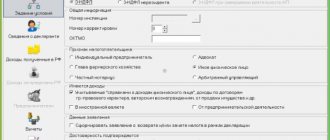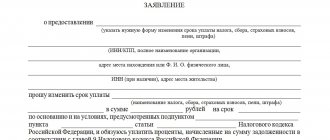The confrontation between the Federal Tax Service and defaulters is increasingly reminiscent of a multi-part film, at the beginning of each part of which the service comes up with another way to identify citizens hiding their income and force them to fulfill their obligations to pay taxes.
As a result, the next tax “scheme”, as a rule, leads to certain results, but defaulters soon find new ways to evade payment. At the end of each part, everyone takes their original positions and prepares for the new “series”. The Federal Tax Service pays especially much attention to the fight against those who unofficially rent out housing.
How did the tax office fight against unofficial landlords?
The Federal Tax Service carries out inspections of lease agreements recorded in the register.
As a result, the majority of citizens secretly renting apartments began to draw up an agreement for a period of 11 months, and such a document does not require state registration. After its expiration, a new contract was simply concluded for the same period. Of course, this did not relieve the landlord from the obligation to pay taxes, but it became much more difficult to identify him. Some time ago, the Federal Tax Service began searching for landlords through migrant tenants, using information databases first of the Federal Migration Service, and subsequently of the Office for Migration Issues . As a result, migrants began to register at “special” addresses.
Finally, it's time for the next part of the series. At the end of last year, the Ministry of Finance proposed methodological recommendations aimed at increasing the efficiency of personal income tax collection. Today, these recommendations are beginning to actively work.
Illegal rental of housing is subject to administrative and criminal liability.
Hundreds of thousands of visitors flooded Moscow and its environs. They come from different regions of Russia and other countries in search of a better life, and some streets and neighborhoods have begun to resemble real ghettos with their own culture and way of life. Something similar is now happening in an elite building in New Moscow, whose residents are tired of uninvited guests who have moved into several apartments.
“Visitors from other countries who ignore the rules of migration legislation face serious liability. Article 18.8 of the Code of Administrative Offenses of the Russian Federation for violation by a foreign citizen or stateless person of the rules of entry into the Russian Federation or the regime of stay provides for punishment from a fine to administrative expulsion,” says civil lawyer Alibek Gukov.
Residents are concerned not so much about migrants as about the behavior of their neighbor, who runs a profitable business. Having bought several apartments and carried out redevelopment, she organized something like a hostel. It rents out premises on a daily and monthly basis; it doesn’t particularly select clients: only those who are willing to pay move in. Thanks to the expansion of Moscow's borders, several districts at once became part of the capital. Only the indigenous people are not happy about these circumstances. Numerous housing complexes with modern architecture, as well as numerous visitors, appeared.
“The hotel business doesn't require much effort. It is enough to register an individual entrepreneur to open a small hostel. Entrepreneurs use a simplified taxation system, but many run their small businesses illegally, trying to save on everything. Any inspection by regulatory authorities can result in serious problems with the law,” says civil lawyer Alibek Gukov.
High demand for affordable housing creates supply. Nobody pays attention to documents or their absence. For just a few thousand rubles a month, foreigners can get a room; some live in small rooms with entire families. In cramped conditions, offensive, but inexpensive. The neighbors are clearly not happy with the guests. Noisy feasts, unpleasant odors and suspicious companies do not in any way brighten the appearance of an elite high-rise building. The residents intend to file a collective appeal to the prosecutor's office and the municipality, since the organizer of the mini-hotel does not want to hear their complaints.
“Owners of illegal hotels and hostels who conduct their business in circumvention of tax laws face administrative liability. Article 14.1 of the Code of Administrative Offenses for carrying out business activities without state registration or in the absence of special permits and licenses provides for punishment in the form of a fine for individuals. If an illegal business brings good income, law enforcement officers can initiate a criminal case under Article 171 of the Criminal Code “Illegal Entrepreneurship,” says civil lawyer Alibek Gukov.
How will the tax authorities deal with secretly renting out housing this year?
In order to answer this question, it is necessary to study the text of the guidelines. In paragraph 2.1.7. The specified document provides information from Rosstat that 50% of transactions for the rental of housing by individuals are carried out unofficially. Most likely, Rosstat is slightly embellishing the situation and the percentage of such transactions is much higher.
The same paragraph suggests more actively involving management companies in identifying illegal apartment rentals.
In order to interest them and force them to work in this direction, the methodological recommendations propose to allocate grants to management companies in the event of an increase in tax revenues due to identified illegal landlords.
Still in the same paragraph of the recommendations, it is proposed to create a “hotline” to receive calls from citizens who want to report cases of illegal housing rental. Citizens will not be paid remuneration for this, unlike management companies.
How can an apartment owner avoid blackmail from tenants?
If you have not paid taxes on income from renting out an apartment, and tenants or even neighbors are afraid that they will tell the tax service about this, you need to take into account some nuances. Firstly, as managing director of MIEL-Arenda Maria Zhukova says, in this case you need to report your income by April 30 next year, and not right now. So this must be a very protracted conflict with the tenants. Secondly, it will be very difficult for tenants to prove that the owner received the money, especially if it was passed from hand to hand and there are no receipts confirming its receipt (the receipt must clearly indicate that this is money for renting an apartment at a specific address). Even if these were electronic transfers, without indicating the purpose of the payment, these transfers can be challenged in court, Zhukova notes. However, in order not to worry and not break the law, it is better to legalize your activities, the expert emphasizes.
There are several options on how to do this. You can submit your income tax return and pay tax by the end of April next year. You can become an individual entrepreneur or a self-employed citizen.
The first option is appropriate if the rental income is of a one-time nature, says Olga Daineko, an expert on the Zhilfin and Finshok projects of the Ministry of Finance of the Russian Federation. The tax rate in this case is 13%. But the landlord will have the right to receive tax deductions - standard, social or property.
“The entire amount of tax on rental income can be reimbursed through tax deductions. Therefore, carefully calculate which option is more profitable for you,” advises Svetlana Efimkina, an expert at the National Center for Financial Literacy, financial literacy consultant for the Vashifinance.rf project. For example, you can return 15,600 rubles a year for training yourself or your family, or 260,000 for buying a home.
If a citizen rents out many premises for long periods, non-residential premises, then it makes sense to register as an individual entrepreneur, Daineko believes. It also makes sense to consider this option for those who rent out expensive housing or several properties. Under the simplified taxation system that is applied by individual entrepreneurs, the tax rate will be 6% or 15% (if the “income minus expenses” system is chosen). You can also use the patent system, the cost of a patent depends on the region and potential income.
Of the options for a simplified tax system, the option with a 6% rate is more suitable for landlords, says Efimkina. “In this case, there is no need to collect documents regarding expenses, especially since expenses cannot always be confirmed. For example, a pipe is leaking, you call a plumber you know and pay him in cash - he won’t give you any supporting document,” says Efimkina. It should be taken into account that, in addition to income tax, individual entrepreneurs are required to pay fixed contributions - for compulsory pension insurance (32,448 rubles per year) and for compulsory medical insurance (8,426 rubles per year).
An individual entrepreneur must keep records and submit reports, draws attention to Nina Akayemova, an expert at the National Center for Financial Markets and a financial literacy consultant for the Vashifinance.rf project. “In some cases, a personal visit to a tax or other government agency is required. Regular reporting may also entail additional costs for running your business. To terminate activities as an individual entrepreneur, you will need to submit an application to the tax authority. Until registration as an individual entrepreneur is terminated, a citizen is obliged to report on his activities, submit declarations and reports, even if he does not actually receive income,” notes Akayemova.
The best option for an ordinary landlord, experts agree, is to become self-employed (this is currently available in 23 regions, the list will expand from July). If the apartment is rented to an individual, the tax will be 4% of income, if to an individual entrepreneur or legal entity, the tax rate will be 6%. The same rate - 6% - will be when renting out housing through an aggregator (since the money will come from the organization). A self-employed person does not have the right to rent out non-residential premises.
“Part of the taxes is sent to the Health Insurance Fund, so that the self-employed have the right to free medical care within the framework established by law. Self-employed people pay pension contributions only on a voluntary basis,” adds Efimkina.
The advantage of self-employment is that there is no complicated reporting - all activities are documented and conducted in a simple mobile application that will calculate everything, says Akayemova. The tax must be paid once a month; filing a declaration is not required. It should be borne in mind that the maximum income of a self-employed person per year should not exceed 2.4 million rubles. “Divide by 12 months, we get 200,000 rubles. This is a significant amount for renting out residential premises,” says the expert. When payment has been received from the apartment tenant, you need to fill out two lines in the mobile application: to whom the service was provided and what amount was received for it. There is no need to print the receipt; it is automatically sent to the specified email address. The tax authority will calculate the tax amount, and a notification about it will appear in the application. Another advantage of this tax regime is that no action is required if the business ceases. No income - no tax - no reporting.
“The main disadvantage of self-employment is that the use of this system does not entail the automatic formation of a pension and social insurance in case of an accident. But this does not exclude the possibility of their voluntary formation,” says the expert. In addition, self-employment does not exclude working under an employment contract, where the employer will pay pension and other contributions.
Results
We can already say that we shouldn’t expect mass “denunciations”: management companies are much more interested in collecting funds for housing and communal services and fighting debtors.
Finding informal landlords would take up too much work time. Most likely, such measures will only be applied in cases where housing is rented to problem tenants.
VAT – 2022
The best speaker on tax topics, , will prepare you for filing your return on January 14 . There are 10 out of 40 places left for the online workshop . The flow is limited, as there will be live communication with the teacher live. Hurry up to get into the group. Sign up>>>
Responsibility for illegal rental of an apartment
What are the dangers of illegal housing rental? Responsibility for such acts is provided for both criminal and administrative. The division of liability depends on the amount of unpaid tax.
If the amount of taxes for 3 financial years is more than 600,000.00 rubles and the share of unpaid taxes exceeds 10% of the taxes payable, then for failure to submit a declaration and non-payment of taxes, criminal liability arises under Article 198 of the Criminal Code of the Russian Federation. The sanction of this article provides for a fine from 100,000.00 rubles to 300,000.00 rubles or a fine in the amount of the wages of the convicted person from 1 to 2 years. Liability is also provided in the form of forced labor, arrest or imprisonment for up to 1 year. Such liability arises for the above act if the amount of unpaid taxes is large. For particularly large sizes, stricter liability is provided. But we will not go into details, since you can study the sanction of Part 2 of Article 198 of the Criminal Code of the Russian Federation yourself.
“I gave myself away”
The Tax Service filed a lawsuit to collect the arrears of personal income tax and accrued penalties from the owner, who rented out his home unofficially.
The Federal Tax Service's accusations were not unfounded: copies of commercial lease agreements for apartments and receipts were presented to the court, according to which the owner received 150,000 rubles in rent from his tenant.
The main question is: where did the tax authorities get these documents from? The answer was surprising: it turns out, from the owner himself.
A year ago, the same court heard a case regarding the recovery of damages under a rental agreement based on his claim: the tenant owed a debt for several months, and also partially damaged the furniture, forcing the apartment owner to go to court.
And now the materials of the case played against him: the owner’s excuses that he did not rent out the apartment to anyone, against the background of the documents he presented, looked completely unreliable.
The court collected from him arrears of taxes, penalties and state duties - a total of 24 thousand rubles (case No. 2a-1133/2018, Magadan City Court).








